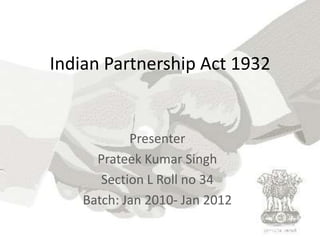Indian partnership act 1932
- 1. Indian Partnership Act 1932PresenterPrateek Kumar SinghSection L Roll no 34Batch: Jan 2010- Jan 2012
- 2. ContentsEssentials of PartnershipŌĆ£PARTNERSHIP NOT CREATED BY STATUS.ŌĆØRegistered Partnership firmsTypes of PartnersMode of giving public noticeRights, Duties and Liabilities of PartnerLiability of a FirmModes of Dissolution of Partnership FirmProcess of Dissolution of Partnership2
- 3. Definition- PartnershipRelation between persons Agreed to share the profits Business carried on by all or any of them acting for all. Persons who have come together are called individually, "partners" Collectively "a firm", Business is carried in the "firm-name".3
- 4. Essentials of PartnershipA partnership is an Association of two or more personA partnership must emerge out a agreementThe business to carried out must be legal and acceptable by law.The agreement must give all the essential details of Partnership e.g. profit sharing percentage, business to be conducted etc.Minor cannot be a partner.4
- 5. ŌĆ£PARTNERSHIP NOT CREATED BY STATUS.ŌĆØ The relation of partnership arises from contract and not from statusE.g. the members of a Hindu undivided family carrying on a family business as such, or a Burmese Buddhist husband and wife carrying on business as such are not partners in such business.5
- 6. Registered Partnership firms- Procedure of registrationRegistration with Registrar of FirmsDetailed statement(informing name, address, partner details etc.) and applicable fee must be deposited with the RegistrarStatement must be signed and verified by all the partners.6
- 7. Unregistered Partnership firms- disadvantagesAny of the partner cannot file suit against the firm or against other partner to enforce his rights.The firm cannot file suit against any third party to claim loss or enforce its rights.Even the ŌĆśright of set offŌĆÖ is not available to the firm (i.e. setting off dues between other firms)7
- 8. Types of PartnersSleeping partner or dormant partnerNominal partnerSub PartnerWorking partner8
- 9. Partner Holding out or by EstoppelE.g. Mr. Ramesh has retired from the firm named R.K Brothers. He has not given a public notice of his retirementMr. Ramesh will still be deemed to be a ŌĆśpartner holding outŌĆÖ or ŌĆśpartner by estoppelŌĆÖ9
- 10. Mode of giving public noticeA copy of the notice is required to be sent to the Registrar of Firms(this is not required if the firm being unregistered)A copy must be published in the local Official gazette and in one local vernacular newspaper circulating in the district.10
- 11. Rights of PartnerTake part in the conduct of businessTo share equally in the profits of the businessTo access to and to inspect and copy from any books of the firmTo be joint owner of the property of the firmIn emergency, take all actions to safeguard firmTo resist introduction or admission of new partnerRight not to be expelled11
- 12. Duties of Partner General Duties: To carry on the business of the firm, to be just and faithful, to give true accounts and complete information.To indemnify the firm for the loss caused by him during the conduct of the firmŌĆÖs businessTo contribute to the losses of the firm in equal proportion.Not to assign his own share to some other partyTo attend to his duties diligently 12
- 13. Liabilities of the PartnerGeneral Liabilities arise when: He fails to be just and faithful to all other partners,
- 14. He fails to carry on the business of the firm in highest common interest,
- 15. He fails to give true accounts.To indemnify13
- 16. Liability of a Firm for wrongful acts of a partnerThe firm is liable in the given below situations:If a loss or injury occurs to a third party due the act of the partner in course of business of the FirmIf a partner acting within his apparent authority receives money or property and misappropriates it.If money received by the Firm in course of business and the partners misappropriate it.14
- 17. Modes of Dissolution of Partnership FirmBy mutual agreement: All partners agree to close business.By notice of dissolution: By one partner giving notice to other partnersBy operation of Law: If one of the partner is adjudicated insolventBy happening of certain contingencies: Expiry at the completion of periodBy a decree of the Court: If the suit is filed against the partnership and the court orders dissolution.15
- 18. Process of Dissolution of PartnershipIssuing a public noticeReturn of premium on premature dissolutionSale of Goodwill after dissolution if anyPayment of Partnership DebtSettlement of Accounts16
- 19. Thank You17
















